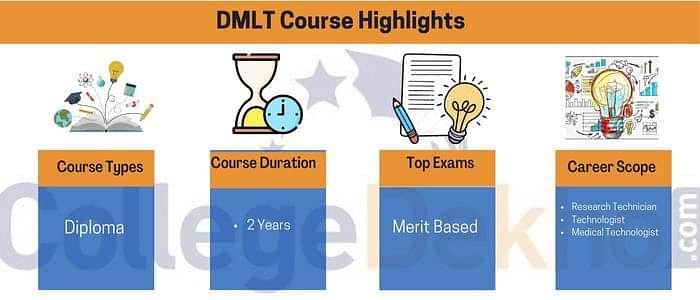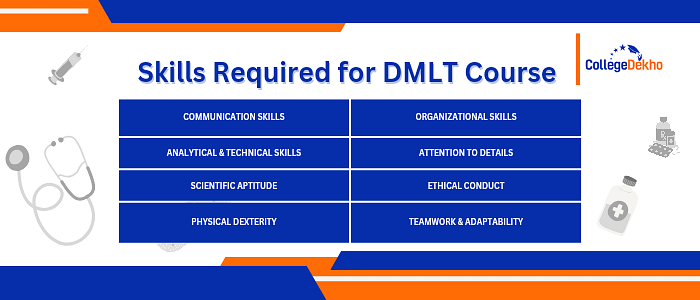DMLT Course - Diploma in Medical Laboratory Technology
DMLT course is a 2-year Diploma programme, that trains students to gain expertise in various diseases, their causes and symptoms. Aspirants successfully qualifying their 10+2 in the Science stream with Physics, Chemistry, Biology and English as core subjects are eligible to pursue a Diploma in Medical Laboratory Technology. After the course, aspirants can consider pursuing job profiles like Medical Laboratory Technician, Assistant Laboratory Technician, Laboratory Assistant, etc.
DMLT Course Overview
DMLT Course full form is a Diploma in Medical Laboratory Technology. It is a 2-year degree programme, offered at several universities across the country. This course teaches students how to examine, evaluate, and identify various diseases through laboratory techniques and procedures. The DMLT admission process includes higher secondary qualifications with at least 50% marks in aggregate with science stream. Admission to DMLT Courses is mostly based on merit but some of the universities may also run their entrance tests. Some of the well-known institute-based entrance exams are the Manipal University Entrance Test, AISECT, Amity University Entrance Test, Jamia Hamdard Entrance Test, etc.
DMLT course is offered both in full-time and part-time mode, and the curriculum includes attending seminars, lab sessions, and practical works along with theoretical study. However, the DMLT Course Subjects in all modes of learning remain the same. The DMLT Course syllabus includes subjects like Biochemistry, Pathology, Microbiology, Haematology etc. The DMLT Course fee ranges from INR 15,000 to INR 1.5 LPA. Some of the popular DMLT job profiles are Medical Lab Technician, Healthcare Assistant, Laboratory Manager, Lab owner, Medical Technologist, Research Analyst etc. The average DMLT Salary may range from anywhere between INR 1.5 LPA to INR 7.5 LPA.
Students must complete their higher education in the science stream with Physics, Chemistry and Biology or Mathematics as major subjects. They should score at least 45%- 50% in aggregate in class 12 examinations. Some Universities may also conduct separate entrance tests where the admissions will depend on the overall test results. Average DMLT Course fees in government colleges range from INR 15,000 to INR 1 LPA and admission to these colleges usually depends on merit scored by the candidates in their 10+2 examinations.
On the other hand, the DMLT Course fees in private colleges may differ from Institute to Institute ranging from INR 40,000 to 1.5 LPA. After completing the Diploma one can expect a Job as a Lab Technician in both Government and private clinics or Laboratories.
Table of Contents
- DMLT Course Overview
- DMLT Course Latest Updates
- DMLT Course Quick Facts
- DMLT Course Highlights
- Why to Choose a DMLT Course?
- Difference between DMLT Vs BMLT
- Types of DMLT Courses
- DMLT Course Eligibility Criteria
- DMLT Course Entrance Exams
- DMLT Course Specialisations
- DMLT Course Admission Process
- DMLT Course Fees
- DMLT Course Syllabus
- Top DMLT Colleges in India
- State-wise Top DMLT Colleges in India
- Scope in DMLT Course in India
- DMLT Course Career Options and Job Prospects
- Courses to Pursue after DMLT Course
- FAQs about DMLT Course
DMLT Course Latest Updates
- Application forms for some of the Universities like NIMS University, Rajasthan are open and can be assessed through their official websites.
- Entrance exam for DMLT Course 2024 details can be assessed from the DMLT admissions 2024
- Applications to AIE CET 2025 are also open and available on DMLT Course admissions.
- Online applications for DMLT Course 2025 will be available from January 2025 onwards
DMLT Course Quick Facts
Mentioned below are some of the quick facts regarding the DMLT course for interested candidates to glance through:
- The DMLT Course duration for the Diploma in Medical Laboratory Technology or DMLT course is 2 years.
- The DMLT course is specifically curated to give students an elaborate idea of the fundamentals of body fluids, pathology, microbiology, etc.
- The average DMLT course fee varies between Institutions. However, the standard course fee for DMLT course admission generally ranges from INR 10,000 to INR 5 LPA approximately.
- The DMLT course fee for private colleges on average starts from INR 20,000 upto INR 4 LPA. On the other hand, the DMLT course fee for government colleges starts from INR 12,000 up to INR 50,000 on average.
- Although there is no centralized entrance exam for DMLT course admission, there are many institutions and universities that conduct a centralized entrance exam for admission to DMLT courses. These DMLT course entrance exams include AISECT, Amity University Entrance test, AIECET etc.
DMLT Course Highlights
Some of the major highlights of the DMLT course are given below:
| DMLT Course full form | Diploma in Medical Laboratory Technology |
|---|---|
| DMLT Course duration | 2 years |
| Entrance Examination | No specific entrance, but colleges like NIMS and a few government institutes conduct a CET for short-listing candidates. |
| Examination Type | Semester-System |
| Eligibility criteria | Passed 10+2 with a minimum of 50% marks |
| Admission Process | Merit or Entrance-based depending upon the institute candidates have opted for. |
| Course Fees | INR 20,000- INR 1 LPA |
| Average Salary | INR 2 LPA - INR 4 LPA |
| Top Recruiting Fields | Government and Private Hospitals, Colleges and Universities, Pathology Labs, Medical Content Writing, Military Services, Blood banks, Clinics etc. |

Why to Choose a DMLT Course?
Students wanting to enter the medical field without devoting years to a particular degree can opt for this 2-year Diploma in DMLT Course. The course offers both government as well as private job opportunities. DMLT Course graduates can work as technicians in labs owned by government Hospitals or private Laboratories. They can also work in blood banks and Pathology Labs.
To go through the benefits of DMLT course, interested candidates must check out the following important reasons for choosing a Diploma in Medical Laboratory Technology:
- DMLT Course as an exclusive stream in the field of medical sciences is currently considered one of the fastest-growing professions in health care globally.
- Additionally, choosing a DMLT course opens up a ton of job opportunities for students after completing the degree. They may choose the right job role for them by scrutinizing the potential of the job profiles their abilities best match with.
- With the constant evolution of human health hazards and the ongoing demand for the advancement of medical technology, various relatively newer medical disciplines are gaining popularity. Scope in DMLT Course is increasing as it is an important part of the healthcare industry. Therefore, choosing the DMLT course is always expected to set ample opportunities in the medical science industry.
- Several DMLT recruiters in India readily offer employment opportunities with good salary packages to DMLT graduates. These companies offer several DMLT jobs such as Lab technicians, MRI technicians, Laboratory managers, Senior lab technologists etc.
- Primarily, after the COVID-19 pandemic, students who have a DMLT course qualification are always given decent importance in the healthcare sector.
- It is important to note that DMLT career opportunities are widespread across both government and private sectors.
- Many illnesses in today's era rely heavily on test data for diagnosis and therapy. This, therefore enhances the importance of the Medical Laboratory Technology role.
- In case an individual is interested, they can easily apply for DMLT course admission abroad as well. The career opportunities for DMLT students abroad are of equal importance as compared to the ones in India.
- DMLT course is comparatively a little less complicated than MBBS OR BHMS. Thus, interested students may find it easy to complete a DMLT course from their desired colleges, and pursue a career in medicine.
- Since a Diploma in Medical Laboratory Technology is a part of Paramedical Sciences, the scope in this field is varied. For example, students can opt for opportunities across molecular diagnostics, molecular biotechnology firms, pathology laboratories, and research labs.
- Interestingly, the DMLT Course salary packages offered to students pursuing a DMLT course are competitive and decent paying. Thus, this makes it easier for students to choose the same without having to worry about future career prospects.
- After graduating with a Diploma in Medical Laboratory Technology course, all students will be deemed eligible to assist doctors in taking samples, testing samples, and so on, under adequate supervision.
When To Pursue DMLT Course?
Candidates who wish to study for a Medical Laboratory Technology can opt for a DMLT course from any of their desired colleges by registering themselves for the admission process. All candidates are required to have completed their 10+2 qualifications, with Physics, Chemistry, and Biology as the core subjects. Moreover, a basic minimum requirement for the DMLT admission process is to secure 50% marks in aggregate (for reserved category 45%) in the 10+2 level. In the case of some institutions/universities, candidates may also choose to directly apply for DMLT admissions through the merit-based selection process. Thus, interested candidates can apply for DMLT admission after completing their 10+2 or a Bachelor’s degree in the same field.
Difference between DMLT Vs BMLT
Listed below is a table comparing features of Diploma in Medical Laboratory Technology (DMLT) and Bachelor of Medical Laboratory Technology (BMLT) courses.
| Feature | DMLT Course | BMLT Course |
|---|---|---|
| Course Duration | 2 years | 4 years |
| Qualification | 10+2 or equivalent with science subjects | 10+2 or equivalent with science subjects |
| Course Content | Emphasis on hands-on laboratory experience and basic knowledge of medical laboratory technology | In-depth study of medical laboratory technology, including theory, practical applications, and advanced techniques |
| Career Opportunities | Medical laboratory technician, assistant laboratory technician, laboratory or healthcare assistant, etc. | Medical laboratory technologist, senior medical laboratory technologist, manager of a medical laboratory, etc. |
| Job Responsibilities | Performing routine laboratory tests, preparing samples, maintaining laboratory equipment, etc. | Performing complex laboratory tests, analyzing results, interpreting data, supervising other laboratory personnel, etc. |
| Advancement Opportunities | Opportunities for advancement are limited, but technicians can improve their skills and knowledge through continuing education | Opportunities for advancement are more varied, including management positions, supervisory roles, and specialized positions in areas such as research or quality control |
It is important to note that the differences between the DMLT and BMLT courses can vary depending on the specific institution and program. To dive deeper into the topic you can read further about the comparison between DMLT vs BMLT. It is also recommended to research different programs and institutions to find the one that best suits your needs and goals.
Types of DMLT Courses
To fulfill the rising demand for DMLT courses, several institutions all over the country have introduced DMLT curricular work in their institutions. Several colleges offer DMLT courses in both online and offline modes as well as in full-time and part-time modes. Here we have given a brief about different types of DMLT courses for the convenience of the students:
| Type of DMLT Course | Average Course Fee | Duration |
|---|---|---|
| Part-Time DMLT Course | INR 30,000 to INR 65,000 | A part-time diploma in the DMLT degree course is mostly chosen by candidates who want to upskill their knowledge. These part-time courses are designed to take less time for the applicants, especially for working individuals. The average duration of a part-time DMLT degree course is 1 to 2 years. Candidates can secure part-time DMLT courses in both online and offline modes. |
| Full-Time DMLT Course | INR 40,000 to INR 1 LPA | With the average course duration ranging from 2 years to 2.5 years, a full-time DMLT degree programme is the most common and widely chosen course by the applicants. The entire course curriculum of the full-time degree course is conducted in offline mode. This involves regular practicals, lab works, and seminars. |
DMLT Course Eligibility Criteria
The DMLT course eligibility criteria in India are as follows:
| Particulars | Details |
|---|---|
| DMLT Course Qualification | The minimum educational requirement is a 10+2 or equivalent examination with Physics, Chemistry, and Biology as mandatory subjects. |
| Minimum Age | A Student should at least be 17 years of age to pursue the DMLT course. However, there is no upper age limit. |
| Required Marks | A minimum of 45% ( for scheduled classes) to 50% marks in 10+2 or equivalent examination is required, depending on the institution. |
| Entrance Exam | Admissions are purely merit-based. However, some institutions may conduct entrance exams for admission to the DMLT course. |
Skills Required for DMLT Course
Pursuing a Diploma in Medical Laboratory Technology (DMLT) course requires certain skills to excel in the field and perform the job effectively. Some of the key skills required for this course include:

DMLT Course Entrance Exams
There is no specific entry test for the Diploma in Medical Laboratory Technology. But few famous and top universities take the entrance exam. Some of the DMLT Course Entrance Exams are mentioned below:
| Common Entrance Text | Details |
|---|---|
| Manipal University Entrance Examination | The test consists of 240 multiple-choice questions; Students need to answer 60 objective questions; the Exam is conducted in computer-based mode; the Medium for the test is English; MET is conducted once every year; the Duration of the test is 120 minutes; The question paper is divided into four sections namely physics, chemistry, biology/mathematics and English; 4 marks are awarded for every correct response and 1 mark is deducted for every wrong response. |
| Amity University Entrance Examination | The duration of the exam is 120 minutes; There are four sections, physics, chemistry, biology/mathematics, and English; A total of 90 multiple-choice questions are asked to the students; The Test is conducted in online mode; 4 marks are awarded for correct answer and 1is deducted for incorrect answer; The Test is conducted once annually. |
| AISECT University Entrance Examination | It is conducted on a national level; The duration of the test is 120 minutes; Students have to sit for this exam in offline mode; Conducted once every year, usually in August; A total of 100 multiple choice questions are asked to the students. |
| JIPMER | Conducted in online mode; The syllabus includes physics, chemistry and biology/math; A total of 200 multiple choice questions are asked to the students; the Total marks of the exam is 800; The Exam is conducted in two shifts: morning and afternoon; Duration of the exam is 2 hours and 30 minutes; There is a scheme of negative marking. |
DMLT Course Specialisations
To diagnose diseases, various tests are needed to be performed. These tests are performed by using Medical Laboratory Technology. One can gain experience by using various types of medical equipment such as MRI machines, CT scanners, X-ray machines, etc. DMLT is known to have better career opportunities abroad, due to which many Indian candidates choose to pursue this course outside India so that they can get higher-paying jobs more easily.
In the DMLT Course, you get a lot of different specialisation courses as given below, candidates can opt for the course that best suits their needs and interests. As previously mentioned, there are a lot of course options available, and the major DMLT course specialisation in India is listed below:
- Microbiology
- Clinical Biochemistry
- Molecular Biology and Applied Genetics
- Haematology
- Radiology
- Coagulation Biomedical Techniques
- Ultrasonography
- Clinical Chemistry
- Biostatistics
- Clinical Pathology
- Immunology and Immunological Techniques
- Electron Microscopy
- Parasitology
- Cytotechnology
- Bacteriology
DMLT Course Admission Process
Even though some colleges conduct their entrance exams for the selections, the DMLT Course admission process mainly follows a straightforward direct selection process based on merit. If the students want to get DMLT course admission through these individual colleges they must check their respective official websites frequently to get updates on the latest information. Listed below are the steps on how to apply for the DMLT admission process:
- The DMLT Course qualification is mainly based on the marks obtained by the candidates in their 10+2 level and on a merit list provided by respective authorities. However, admissions in some colleges like St. John’s University and Aligarh Muslim University are based on the marks scored in their respective entrance exams.
- The candidates are required to fill out the DMLT application form and provide all the required important documents. They have the option to submit the required documents directly to the college or through online mode.
- For the online process, the students are required to visit the institute’s official website and register for the entrance exam.A registration fee is charged at this step on completion of which you will be guided further to provide the personal information and required documents.
- If the candidates wish to submit the application form in offline mode, they can visit the college campus and complete the formalities by visiting the Admission Department to provide all the required documents.
- All students are required to have scored at least 45-50 per cent aggregate in their 10+2, and they must have PCM/PCB as mandatory subjects to be eligible for the DMLT course.
- After qualifying for the entrance exam, the candidates are required to apply for the counselling session during which they will be assigned the desired colleges.
- Interested candidates can look up for DMLT Course Admission 2024 in India, to get detailed information about the admission procedure.
DMLT Course Fees
The average DMLT Course fee may vary between the range of INR 20,000 to INR 1 LPA. The factors determining the DMLT Course fee include the type of institutions, location of the college, faculty and infrastructure, course type, seat intake, etc. Moreover, the DMLT Course fee in government and private colleges are vastly different from one another. While the exact DMLT Course fee structure is defined by each college at their official websites respectively, here we have provided an estimated average DMLT Course fee for government and private colleges, to provide an idea to the students of the expected course structure for pursuing a DMLT course. Refer to the tables below to find out the DMLT Course fee.
DMLT Course Fees In Government Colleges
DMLT Course Fees in Government Colleges usually range between INR 20,000 to INR 80,000 on average. Although the data mentioned below may be subject to change as per the respective colleges, a detailed fee structure for DMLT Government Colleges has been mentioned below for reference:
DMLT Government Colleges | DMLT Course Fee (Average) |
|---|---|
IIT Patna | INR 80,000 |
Delhi Pharmaceutical Sciences and Research University | INR 20,000 |
IPGMER | INR 30,000 |
Banaras Hindu University | INR 30,000 |
Seth GS Medical College | INR 1.2 LPA |
DMLT Course Fees In Private Colleges
The DMLT Course Fees in Private Colleges usually range between INR 90,000 to INR 2 LPA on average. Although the data mentioned below in the table may be subject to change as per the changes introduced in the respective colleges, a detailed fee structure for DMLT Private Colleges has been mentioned below for reference:
DMLT Private Colleges | DMLT Course Fee (Average) |
|---|---|
Rama University | INR 1.5 LPA |
Shri Sai College of Nursing and Paramedical Science | INR 80,000 |
Corporate Group of Institutions | INR 2 LPA |
Apex University | INR 55,000 |
DMLT Course Syllabus
DMLT course focuses on the practical application of theoretical knowledge. Seminars, practical applications in labs, classroom lectures, and even internships are offered to students to learn about the nature of practicality that this subject requires. The list below provides a semester-wise breakdown of the subjects that will be covered in this course. You can also get the latest syllabus details on DMLT syllabus 2024.
| DMLT Course Syllabus Semester Wise | |||
|---|---|---|---|
| First Semester | Second Semester | Third Semester | Fourth Semester |
| Anatomy of a Human | Physiology of Man | Human Physiology II | Techniques of Histopathology |
| Clinical Biochemistry Fundamentals | Biochemistry Fundamentals | Technical and Metabolic Biochemistry | Pathology Laboratory |
| Human Science Fundamentals | Technology of Information and Communication | Microbiology (Technical) | Microbiology in Clinical Practice |
| Communication in English | Community Improvement | Activities for Community Development II | Pathology in Clinical Practice |
Top DMLT Colleges in India
Mentioned below are the top DMLT government and private colleges in India, along with their NIRF rankings:
| Name of the Institute | NIRF 2024 Ranking |
|---|---|
| Delhi Pharmaceutical Sciences and Research University | 16 |
| IIT Patna | 34 |
| Banaras Hindu University | 7 |
| Seth GS Medical College | - |
| IPGMER | 24 |
| Rama University | - |
| Shri Sai College of Nursing and Paramedical Science | - |
| Corporate Group of Institutions | - |
| Apex University | - |
State-wise Top DMLT Colleges in India
To make your college hunt easier, a detailed state and city-wise top-ranked DMLT Colleges are listed below.
Madhya Pradesh
| College/University | City |
|---|---|
| Rabindranath Tagore University | Bhopal |
| Rajiv Gandhi Medical College | Bhopal |
| RKDF University | Bhopal |
| LNCT University | Bhopal |
| AKS University | Satna |
Maharashtra
| College/University | City |
|---|---|
| Seth GS Medical College | Mumbai |
| Byramjee Jeejee Government Medical College | Pune |
| Mumbai University | Mumbai |
| Bharati Vidyapeeth Deemed University | Pune |
| Shivaji University | Kolhapur |
West Bengal
| College/University | City |
|---|---|
| IAS Academy | Kolkata |
| Bankura Sammilani Medical College | Bankura |
| Netaji Subhas Open University | Kolkata |
| Murshidabad Medical College and Hospital | Murshidabad |
| Calcutta School of Tropical Medicine | Kolkata |
Punjab
| College/University | City |
|---|---|
| Sri Guru Gobind Singh College of Pharmacy | Chandigarh |
| DAV College | Chandigarh |
| Lovely Professional University | Jalandhar |
| Adesh University | Bhatinda |
Tamil Nadu
| College/University | City |
|---|---|
| Madras Christian College | Chennai |
| SRM Institute of Science and Technology | Chennai |
| Dr. N.G.P Arts and Science College | Tiruchirapalli |
| Holy Cross College | Tiruchirapalli |
| Hindustan Institute of Technology and Science | Chennai |
Gujarat
| College/University | City |
|---|---|
| SMT. NHL. Municipal Medical College | Ahmedabad |
| Sardar Patel University | Vallabh Vidyanagar |
| Parul University | Vadodara |
| Rai University | Ahmedabad |
| Sumandeep University | Vadodara |
| Ganpat University | Mehsana |
Scope in DMLT Course in India
A candidate’s scope in the field of Paramedical Science is determined by the potential of their talent. The demand for Paramedical Sciences is growing at a rapid pace, which is expanding the potential and scope for Medical Laboratory Technology. Through the DMLT course, interested candidates can pursue a variety of specializations and get in-depth knowledge and training about the respective specialities. Students can pursue an even more advanced diploma course, a Bachelor’s degree in MLT, or a certification course after completion of their Diploma in Medical Laboratory Technology, or DMLT.
The DMLT course equips the candidates with both theoretical and practical knowledge in the field of Medical Laboratory Technology even though DMLT is a diploma degree. After graduating from DMLT, there are many courses that one can pursue further which will utilize their knowledge and improve their skills in this field of Medical Laboratory and Technology. The scope in DMLT Course can be widened if the candidates pursue some of the undergraduate and certification courses listed below, after completing their Diploma in Medical Laboratory and Technology.
UG Courses | Certificate Courses |
|---|---|
Medical Lab Technology | Anaesthesia Technician |
Medical Laboratory Technology | Blood Bank Technician |
Medical Imaging Technology | Dark Room Assistant |
Clinical Laboratory Technology | Radiography & Imaging Technique |
DMLT Course Career Options and Job Prospects
The students who have completed the DMLT Course are eligible to apply for jobs and/or internships in their selected career profile. Following completion of the Diploma in Medical Lab and Technology, the candidate can follow some of the undergraduate and certificate courses listed below (DMLT). Students who complete their DMLT course can work in a variety of medical facilities and laboratories. Here are the best-recruiting businesses for students in the private and public sectors, among many others.
| DMLT Areas of Employment | Job Profile |
|---|---|
Pathology Labs | Lab consultants |
Government and private hospitals | Research Analysts |
Blood Banks | Technologists |
Clinics | Lab Technician |
Academic Writing | Medical Writers for journals or websites |
Salary After DMLT
The table below shows the average monthly pay offered for various job roles performed by MLT applicants.
| Job Profiles | Salaries (Monthly) |
|---|---|
| Laboratory | INR 16,248 |
| Research Technician | INR 21,956 |
| Research Assistant | INR 22,792 |
| Medical Technologist | INR 17,407 |
| Laboratory Analyst | INR 17,337 |
| Technologist | INR 21,278 |
Top Recruiters for DMLT
All the hospitals, clinics and laboratories in the country need DMLT Graduates for carrying out and analyzing blood, fluid and tissue samples. These recruiters seek people with in-depth expertise in medical laboratory technology and provide DMLT graduates with high paying DMLT jobs. Therefore, you can find the list of Top DMLT Job Recruiters mentioned below:
- Dr. LalPathLabs
- SRL Diagnostics
- Bio Rad Laboratories
- Apollo Health and Lifestyle
- House of Diagnostics
- Maxim Healthcare
- Reliance Industries
- Cipla
- Dr. Reddy’s
- Sun Pharmaceuticals
- Fortis Hospitals and Labs
- Sri Gangaram Hospitals
- Medanta
- Ranbaxy
Courses to Pursue after DMLT Course
After completing a Diploma in Medical Laboratory Technology, you can pursue higher education in the same discipline. Studying abroad will open wider opportunities for you concerning studies and jobs. The courses to choose after your Diploma in MLT are given below.
| Course Name | Average Duration | Average Course Fee Range |
|---|---|---|
| BSc in Medical Laboratory Technology | 3 years to 3.5 years | INR 25,000 to INR 50,000 |
| BSc in Medical Imaging Technology | 3 years to 4 years | INR 37,000 to INR 80,000 |
| BSc in Clinical Laboratory Technology | 3 years to 3,5 years | INR 27,000 to INR 75,000 |
| Bachelor of Medical Lab Technology (BMLT) | 3 years to 3.5 years | INR 30,000 to INR 85,000 |
| Certificate Course in Anaesthesia Technician | 3 months to 6 months | INR 10,000 to INR 17,000 |
| Certificate Course in Dark Room Assistant | 3 months to 7 months | INR 12,000 to INR 15,000 |
| Certificate Course in Training of Laboratory Assistants | 6 months to 1 year | INR 17,000 to INR 25,000 |
| Certificate Course in Medical Record Technology | 6 months to 1 year | INR 5,000 to INR 12,000 |
| Certificate Course in Blood Bank Technician | 3 months to 6 months | INR 13,500 to INR 17,000 |
| Certificate Course in Radiography and Imaging Technique | 6 months to 1 year | INR 20,000 to INR 25,000 |
| Certificate Course in Cath Lab Technician | 6 months to 1 year | INR 7,000 to INR 15,000 |
| Certificate Course in Clinical Diagnostic Techniques | 6 months to 1 year | INR 15,000 to INR 20,000 |
FAQs about DMLT Course
Do I need to study Physics in order to pursue the DMLT course?
In order be considered eligible for the DMLT course, one must pass the Science stream from a recognized 10+2 exam. Aspirants should focus on physics, chemistry, and biology subjects in general.
I didn’t take Biology in classes 11 and 12th, can I take admission to DMLT course?
Students who have studied 10+2 education with Physics, Biology, and Chemistry are eligible for the DMLT course. One has to opt for these subjects mandatorily in 10+2 studies.
Do I need to appear for NEET to take admission in DMLT course?
No, NEET is not necessary for DMLT course admissions in India.
What is a DMLT course?
DMLT course or Diploma in Medical Laboratory Technology programme is a 2-year course that can be pursued after the successful completion of 12th level of education. This medical course comprises advanced professional learning in the prevention, diagnosis, as well as treatment of diseases in patients via clinical laboratory tests.
Is it possible to pursue DMLT after completing BSc?
Yes, it is possible. Candidates can opt for DMLT course right after graduation.
Is there any common national-level entrance exam held for the DMLT course?
No, there's no common national entrance test held for Diploma in Medical Laboratory Technology (DMLT). However, many colleges conduct their own entrance exam to grant students admission into the course.
Who are the top recruiters in DMLT course?
The top recruiters after DMLT course completion are listed below.
- Apollo Hospitals
- Fortis Hospitals and Labs
- Holy Family
- Medanta
- Ranbaxy
- Max Health Care
- Sun Pharma
- Sri Gangaram Hospitals
What is the duration of DMLT course?
The course duration is 2 years.
Can I pursue MLT or MSc after completing DMLT?
Undergraduate students are eligible to enter MLT, MSc. Following a diploma, you cannot pursue a Masters degree. To be eligible for MLT or MSc, you must have completed an undergraduate course, such as BMLT, BSc, or equivalent.
Can I become a Medical Officer after finishing DMLT?
An undergraduate degree is required to work as a Medical Officer.
Can I work as a nurse when I finish DMLT?
No, an MLT qualification cannot be used to work as a nurse. You might instead work as a lab technician or technologist. To work as a nurse, you must have a nursing degree or diploma.
Can I open a lab after completing DMLT?
To create a Diagnostic Laboratory or hire a pathologist for signature, you must first obtain a degree.
Is it possible to pursue DMLT after completing a BSc?
Yes, it is conceivable. Going into DMLT after graduating does not sound particularly ambitious. Students might instead pursue advanced studies in clinical research and other PG courses for future employment opportunities.
Can I take the DMLT course while also taking PCM?
The DMLT course is tied to medical diagnosis. Such courses require a solid understanding of biology. In general, 10+2 is the minimum need for DMLT, with Physics, Chemistry, and Biology as required subjects. Though some colleges also offer the subject with PCM.
What are my job options in DMLT?
There have been numerous opportunities in the field of health care systems in recent years. The current global crisis necessitates progress in all aspects of health care systems, including diagnostics. With the opening of new laboratories and hospitals, there is a significant demand for lab techs, professionals, and so on. Without a doubt, students who choose MLT courses can benefit greatly.
Which is preferable, DMLT or pharmacy?
Both have significant advantages in their respective fields, the former for disease diagnosis and the latter for disease cure; both play an important part in the health-care system. It is entirely dependent on one's desire in whatever profession to pursue.
Related Questions
Popular Courses
- Courses
- DMLT Course














